Politics Archives
December 18, 2002
March 31, 2003
Who is Accountable?
http://www.tompaine.com/feature.cfm/ID/7501
April 1, 2003
The Face of War
http://news.yahoo.com/news?tmpl=story2&u=/030329/170/3np0t.html&e=7&ncid=996
The missile commander asked, "What window do you want us to put it through, sir?"
http://news.yahoo.com/news?tmpl=story2&u=/030331/161/3o8pr.html&e=8&ncid=996
April 14, 2003
Thoughts on the Military and Foreign Policy: Might Makes Right
June 29, 2003
There Must Be A Reckoning
George W. Bush, President of the United States of America, is a Liar.
http://www.tompaine.com/feature2.cfm/ID/8195
November 11, 2003
Thinking Politically 2
I was told a story that relates to affirmative action in a way.
A coach was once asked if, given two athletes that could run from one end of the field to the other in the same amount of time, same grades, same build, same height/weight, except one of them had excellent form and the other had lousy form, which would he recruit and/or want on his team. The answer? The one with lousy form. Because the one with great form is fine, but the one with lousy form can be trained to be even better.
Similarly, if you have two people equally qualified, and yet one has raised themselves from the ghetto, and the other has come down from Hyde Park (affluent part of town), pick the one from the ghetto. They are going places, and will improve faster than the one who didn't.
Interesting way to look at it.
November 20, 2003
Gay Rights
November 22, 2003
Lies and Lying Liars
 It makes a point, similar to the one Al Franken makes in his book Lies and the Lying Liars who tell them. Back in the day, a technique in politics that was looked down upon was something called "mudslinging", or saying nasty and possibly untrue things about your opponent. Political discussion in this country these days is dominated by exactly that, except the people throwing mud around have lots more mud to throw than they used to, and are much more sophisticated about throwing it (and particularly, since conservatives are in power and are taking over the media (yes, I'm talking about YOU, Fox News, Limbaugh, Dr. Laura, Sean Hannity, Ann Coulter, et al.), the conservative side of the political spectrum). Loaded polls ("how would your opinion change if you found out candidate X had done Y?"), blatantly untrue books ("Treason!"), etc. etc. etc. make for some really slick mudthrowing that it can hardly be considered mudthrowing, because the term sounds so messy. If you're gonna throw mud, at least be funny about it (thank you, Al Franken).
But the cartoon really speaks to something we all must have noticed by now. Our conservative champions and voiceboxes keep turning out to have nasty little secrets. Limbaugh is/was addicted to drugs, the staunchest supporters of the sanctity of marriage have had who knows how many, even Jessie Jackson was unfaithful to his wife. It's just... depressing. But, when talking about the religious right, and how unexempt the (ultra?)-conservative and/or religious right leaders seem to be from the same thing makes for some pretty spiffy cognitive dissonance.
Ah, so I've gone and explained the comic's humor away... ah, well—it strikes a nerve for me.
It makes a point, similar to the one Al Franken makes in his book Lies and the Lying Liars who tell them. Back in the day, a technique in politics that was looked down upon was something called "mudslinging", or saying nasty and possibly untrue things about your opponent. Political discussion in this country these days is dominated by exactly that, except the people throwing mud around have lots more mud to throw than they used to, and are much more sophisticated about throwing it (and particularly, since conservatives are in power and are taking over the media (yes, I'm talking about YOU, Fox News, Limbaugh, Dr. Laura, Sean Hannity, Ann Coulter, et al.), the conservative side of the political spectrum). Loaded polls ("how would your opinion change if you found out candidate X had done Y?"), blatantly untrue books ("Treason!"), etc. etc. etc. make for some really slick mudthrowing that it can hardly be considered mudthrowing, because the term sounds so messy. If you're gonna throw mud, at least be funny about it (thank you, Al Franken).
But the cartoon really speaks to something we all must have noticed by now. Our conservative champions and voiceboxes keep turning out to have nasty little secrets. Limbaugh is/was addicted to drugs, the staunchest supporters of the sanctity of marriage have had who knows how many, even Jessie Jackson was unfaithful to his wife. It's just... depressing. But, when talking about the religious right, and how unexempt the (ultra?)-conservative and/or religious right leaders seem to be from the same thing makes for some pretty spiffy cognitive dissonance.
Ah, so I've gone and explained the comic's humor away... ah, well—it strikes a nerve for me.
November 25, 2003
Gay Marriage, a different way of looking at it
I was recently sent a link by a friend (Arun) that was an interestingly different perspective on the usual argument about gay marriage. Another friend and I noted that many arguments against gay marriage seem to have, at their heart, the overwhelming conviction that gay people, marriage (by way of gay sex) are “icky”. This is not particularly conducive to logical or productive discussion. But here’s the link.
Essentially, it makes the point that while you’re redefining the bounds of marriage away from the strict traditional definition, whatever your intentions are, how do you decide where to stop expanding the definition? Taking the usual arguments to their logical conclusions leads to some outcomes that are not particularly what people usually want when redefining marriage. Makes you think… and even question the institution of Marriage itself.
Some more extensive pondering is necessary, I think.
December 8, 2003
The Democratic Vision
December 29, 2003
The Greatest Threat
The greatest danger to America's dominant position today is not Islamic fundamentalism. It is the arrogance of American power.and the other:
The social conservatives on the Republican Right are praying (literally) that a revival of the Cold War mentality of the 1950s might restore some of the conservative moral values that were weakened by the counter-culture of the 1960s and 1970s, which were totally swept away by the Clinton Administration.
March 18, 2004
Liars
April 6, 2004
Second Grade Classroom Photo Op
 If you can recognize this photograph, you know what it means.
This is a picture of President George W. Bush on September 11, 2001 sitting in a second-grade classroom, as he is informed that the second plane has crashed into the World Trade Center. He had been informed of the first plane before entering the room.
It galls me that, while he'd been told by several people, including the US Commission on National Security/21st Century a few months earlier, not to mention Clarke and other terrorism advisors that a terrorist attack, possibly involving planes, was likely around then, that instead of take up the reigns - go to an "undisclosed location" or something, instead he continued with his photo-op. Better presidents have cancelled photo-ops to drive to Salt Lake City and settle UNION disputes, much less possible terrorist attacks on the World Trade Center. So, I think this photo is telling.
What, you might ask, did I expect him to be doing? I don't know. I'm fairly confident that there's something a president can do while our country is under attack besides listen to second graders read the Itsy-Bitsy Spider to him. MY eyes were glued to the television while it was going on, watching in horror. You'd think that would be the LEAST of what the President of our fine nation would be doing.
If you can recognize this photograph, you know what it means.
This is a picture of President George W. Bush on September 11, 2001 sitting in a second-grade classroom, as he is informed that the second plane has crashed into the World Trade Center. He had been informed of the first plane before entering the room.
It galls me that, while he'd been told by several people, including the US Commission on National Security/21st Century a few months earlier, not to mention Clarke and other terrorism advisors that a terrorist attack, possibly involving planes, was likely around then, that instead of take up the reigns - go to an "undisclosed location" or something, instead he continued with his photo-op. Better presidents have cancelled photo-ops to drive to Salt Lake City and settle UNION disputes, much less possible terrorist attacks on the World Trade Center. So, I think this photo is telling.
What, you might ask, did I expect him to be doing? I don't know. I'm fairly confident that there's something a president can do while our country is under attack besides listen to second graders read the Itsy-Bitsy Spider to him. MY eyes were glued to the television while it was going on, watching in horror. You'd think that would be the LEAST of what the President of our fine nation would be doing.
April 13, 2004
Pope against the war in Iraq?
Not far from there, an entire people is the victim of a constraint which puts it in hazardous conditions of survival. I refer to our brothers and sisters in Iraq, living under a pitiless embargo. In response to the appeals for help which unceasingly come to the Holy See, I must call upon the consciences of those who, in Iraq and elsewhere, put political, economic or strategic considerations before the fundamental good of the people, and I ask them to show compassion. The weak and the innocent cannot pay for mistakes for which they are not responsible. I therefore pray that this country will be able to regain its dignity, experience normal development, and thus be in a position to re-establish fruitful relations with other peoples, within the framework of international law and world solidarity.The Pontiff referred to it as a pitiless embargo, which it seems he was unequivocally against. Does this mean that he's anti-American? No - but what does this have to do with my point? I'm pointing out that he is not, interestingly, blaming the predicament of the Iraqi people on Saddam. Why? Obviously, if Saddam just did what we (the US) told him to do, the embargo would be lifted. Why does he blame those who "put political, economic or strategic considerations before the fundamental good of the people" rather than Hussein? Next, on Sunday, 16 March 2003, the Pope said in his Angelus the following:
That is why, in the face of the tremendous consequences that an international military operation would have for the population of Iraq and for the balance of the Middle East region, already sorely tried, and for the extremisms that could stem from it, I say to all: There is still time to negotiate; there is still room for peace, it is never too late to come to an understanding and to continue discussions.So, he is encouraging the relevant leaders to not go to war, and to instead continue to negotiate. In fact, it is never too late to negotiate, he says. He also says:
I belong to that generation that lived through World War II and, thanks be to God, survived it. I have the duty to say to all young people, to those who are younger than I, who have not had this experience: "No more war" as Paul VI said during his first visit to the United Nations. We must do everything possible. We know well that peace is not possible at any price. But we all know how great is this responsibility. Therefore prayer and penance.So, the Pope quotes another Pope in encouraging people to avoid war. "No more war," he says, using his weight as a man who lived through World War II to further emphasize the point. He also says that "We must do everything possible." What could he mean by that? I take it to mean that he thinks we should do everything that is possible in order to avoid war. Then the Pope said, in his Saturday, 22 March 2003 Angelus that:
When war threatens humanity's destiny, as it does today in Iraq, it is even more urgent for us to proclaim with a loud and decisive voice that peace is the only way to build a more just and caring society. Violence and arms can never solve human problems.Violence can NEVER solve human problems, eh? Now, the possible way to rework the obvious impression that I get is that he's simply saying that Democracy (and of course Prayer) is the way to solve the problems over in Iraq, and that the violence is simply a method of getting there. The problem with this is that it supposes that the Pope is a proponent of the "the ends justify the means" school of thought (as long as violence is ended and we get around to democracy eventually, then it's all okay), which I'm pretty certain he isn't. If he is, then this argument is invalidated. Then, on November 16, 2003, the Pope said in his Angelus that:
In this context, I renew my firm condemnation of every terrorist act perpetrated recently in the Holy Land. At the same time I must point out that the dynamism of peace seems, unfortunately, to have been halted.This seems to me (and I've been wrong before) that he's making sure that people don't misunderstand his frustration as an endorsement of terrorism, but at the same time emphasizing that he is displeased that negotiations and the peace process has been abandoned. Conservatives would love to tell you that obviously the Pope hasn't condemned the actions of the United States, and therefore he's all for them. But, you'll notice he didn't condemn Saddam's actions either. Which means he wasn't up for condemning either side---if he's going to refuse to condemn a regime that tortured and killed it's own people in massive numbers, he sure wasn't going to turn around and condemn the invasion and deposition of such a regime, regardless of whether he disliked the invasion or not. In fact, as I demonstrated earlier, he has a tendency to blame the rest of the world rather than Iraq, for whatever reason. Does it seem like he's thrilled with the invasion of Iraq by American and the Coalition of the (increasingly un-)Willing forces? Not the way I see things. Quite the opposite, he seems to view violence as a defeat for humanity as a whole (definitely not a good thing (do you think Saddam can defeat humanity as a whole?)). Is he an anti-American al Qaeda sympathizer actively working for the defeat of the United States? Only if you drink Rush Limbaugh's flavor of Kool-Aid.
July 5, 2004
Fahrenheit 9/11
I saw the movie recently. My overall impression was that it was a decent quality film. It had a few snide comments that I could have done without, and it was a bit slow in parts. I also definitely agree with those reviewers who say that the movie is much better when Moore gets out of the way and just lets people tell their stories, rather than getting involved in the film himself. It did however have a bunch of cool shots in it and neat quotes from people. Here’s a bunch of the key bullet points I extracted from the movie:
- Bush sat in an elementary classroom photoshoot even after he heard about the second plane crashing into the World Trade Center, and even after he was informed by an aide that “the country is under attack.”
- Bush shipped bin Laden’s family members out of the country via plane on September 13th (at a time when virtually all other planes were grounded).
- Bush received large amounts of money when he was young and starting an oil business with many failures from the bin Laden family (owners of the second largest fortune in Saudi Arabia)
- Bin Laden family invested, with the Bush family, in the Carlyle Group, owners of United Defense, makers of many of the assault vehicles used by the US Army, and thereby profited from the invasions of the Middle East
- Bush tried to prohibit Congress from investigating the events of September 11th, and failed.
- Bush tried to prohibit independent investigation into the events of September 11th, failed, but classified the reports they produced.
- 5,000 family members of September 11th victims sued Saudi Arabian royalty. The Saudi’s were defended by James Baker (senior counselor to the Carlyle Group, Secretary of State and Chief of Staff under George Bush Sr., Secretary of the Treasury and Chief of Staff under Reagan, and Secretary of Commerce under Ford).
- Osama Bin Laden is a Saudi, and so were 15 of the 19 hijackers.
- 11,000 troops were sent to Afghanistan (fewer than the number of police officers in Manhattan).
- Bush quote:
- Bush invades Iraq because of threat of weapons of mass destruction (WMDs), insists upon links to Al Qaida.
- President makes speech on aircraft carrier in front of professionally printed “Mission Accomplished” banner, saying quote, “the United States and her allies have prevailed” while Osama bin Laden remains at large and American military casualties continue.
- Military troops in Iraq complain that they are underpowered.
- Recruiters are out in force (understandably).
- Bush proposed cutting combat soldier’s pay by 33% and cutting assistance to their families by 60%, opposed giving veterans an additional $1 billion in health care benefits, and supported closing veteran hospitals, while doubling prescription costs for veterans and opposing full benefits for part-time reservists.
- Brett J Petriken, killed in battle May 26th 2003, was docked pay for the remaining 5 days of the month he couldn’t work because he was dead.
- This is from a soldier’s letter, read by his mom, received a week before sh got word that he had been killed in action:
Hello. Hey momma, well, sorry I haven’t been able to call. They took the phone seven days ago. I got the letter and box. That is so cool. Your first grandson came the same day your oldest son did. How is everyone? I’m doing fine. We are out here in the sand, in wind storms, waiting. What in the world is wrong with George? Trying to be like his dad, Bush. He got us out here for nothing whatsoever. I’m so furious right now, Momma. I really hope they do not reelect that fool, honestly. I am in good spirits and I am doing okay. I really miss you guys. Thanks for the bible and books and candy. I really look forward to letters from you guys. Well, tell all the family hello and that I am doing fine. We don’t expect anything to happen any time soon. I cannot wait to get home and get back to my life. Tell Spudnik congrats and I’ll see my first nephew soon, as soon as I get back to the states. Hope you guys are doing okay, and keep sending the mail. It makes getting through the days easier. Well I’m on my way to bed so I will write you guys soon. I love and miss all of you guys.
- Of 535 members of Congress, only one has a son in Iraq.
July 13, 2004
Cliff Notes
I was sent a good opinion piece from the Boston Globe, pulling together a few key observations from the apparent intelligence problems the country has had. The key observation is summarized in the following excerpt:
In plain English, the Central Intelligence Agency was serving Bush large helpings of baloney in the form of summaries of analyses and conclusions that were directly contradicted by the detailed information on which these analyses and conclusions were supposedly based. For those seeking to blame the summaries, including Bush’s own campaign and policy big shots, the desperate finger-pointing works only on the basis of an assumption that is grounds for tossing Bush out of office.
To try to escape accountability by blaming CIA summaries, the president would have to ask the country to believe that he led it to war after reading a few cover pages without once glancing at the backup material (sic) that was sent to him and his top advisers. This view of the Bush style—big picture and full of alleged moral clarity—is grounds all by itself for electing a new president.
July 19, 2004
Revisionist History
 An interesting commentary. Gads, I love Calvin and Hobbes—not because I think they're always right, but because they come up with some really insightful observations.
An interesting commentary. Gads, I love Calvin and Hobbes—not because I think they're always right, but because they come up with some really insightful observations.
August 5, 2004
Vacation
Due to a conversation I had with a friend recently, I did a little research into presidential vacationing. I found this link which enumerates the amount of vacation taken by the last four presidents. Let’s pretend an average person gets 2 weeks of vacation per year (probably more like 1 week, but let’s be generous). So, pre-supposing weekends are off, and that there are 56 weeks in a year, that’s 280 work days in a year. Two weeks off is 10 of those days, for a total of about 3.5% of the year that a person gets as a vacation. Update (9/14/04): As Jeff points out, I had a brain-fart on the number of weeks in a year. There are 52 weeks in a year, which makes it 260 work days in a year. Two weeks off, or 10 days, is approximately 3.85% of the year. Alternatively, if you view weekends as vacation time, that’s two times a week, or 104 days, plus 10 extra days of vacation, that’s 114 days of vacation, or about 31.2% of the year. Now, to compare with the presidents…
Let’s start with Jimmy Carter. Carter was President for a single 4-year term. Over those 4 years, he took 79 days of vacation. Assuming he didn’t get any weekends off, that’s 5.4% of the time that he was on vacation. Not too bad, all things considered. He was the most powerful man in the world, but he basically took about 20 days off per year—about 3 weeks.
Next up: Ronald Reagan. Reagan was President for 8 years, and took 335 days of vacation during that time. Doing quick math, that’s almost 365 days, which means it’s almost a YEAR of vacation, which means he was on vacation almost 1/8th of the time. Doing more math, to be more precise, that’s 11.4% of the time that he was on vacation—twice as much as Carter.
Next up: George Herbert Walker Bush (Bush Sr.). Bush Sr. was President for 4 years, and took 543 days of vacation time. 543. Five hundred fourty three days of vacation. That’s a year and a half! Out of FOUR! That’s 37% of the time! He was on vacation more than one out of every three days. He got paid for four years of work, but only worked two and a half of them. Put another way, every year, he took more than four months of vacation. Yowza.
Next up: William Clinton. Clinton was President for 8 years, and during that time took 152 days of vacation. As a percentage, that’s approximately 5.2% of the time—even less than Carter.
Next up: George Walker Bush Jr. Bush Jr. has been president for less than 4 years so far. As of August 2003 (with a year and a half remaining in his (first) term), he had been on vacation 250 days, or approximately 27% of the time. That means every year he’s only taken three months of vacation, on average. Compared to his father, he’s a workaholic!
Not so fast, says Fred Kaplan, staff writer for Slate Magazine. Prior to September 11, 2001, George W. Bush was on vacation for 96 days. Given that he’d taken office on January 20th of 2001, that means that as of September 11th, he’d been “on the job” for 234 days. If 96 of those were vacation days, he was on vacation 41% of the time. Apparently he got guff for that, and has since been taking less vacation, bringing his average down to a measly 27% almost two years later by taking a mere 154 more days of vacation, which, giving him the benefit of the doubt, means he averaged only to be on vacation 21% of the time after September 11th (as of August 2003).
But let’s not depend on a single source… It seems The Washington Post has been doing some counting too, and they disagree with Doug Griffin of Counterbias. As of April 2004, Bush spent 233 days at his ranch in Crawford, Texas. Add to that his 78 visits to Camp David and 5 visits to Kennebunkport, Maine gives you a grand total of more than 500 days on vacation at one of Bush’s usual retreats. That’s a lot! That’s more than 40% of his time STILL on vacation!
Conveniently, Yahoo has an Ask Yahoo feature that has answered the following question: How many vacation days has George W. Bush taken to date as President? How does that compare with Clinton? They come up with similar figures (and they cite the Washington Post).
Back in 2001, the San Jose Mercury News newspaper commented on it as well, with an article titled Bush Break Longest in a Generation commenting that Bush’s 30+ days of vacation during August 2001 was the longest vacation since Nixon in 1969.
But this sounds like a bunch of liberal whining, doesn’t it? I mean, don’t presidents get weekends off? 42% has gotta be misleading, doesn’t it? And in fact a couple people attempt to “debunk” this number. The way to debunk these numbers is to point out that these numbers include weekends and federal holidays, and that these so-called “vacations” were working vacations, where Bush met with foreign leaders and went out to “listen to the people”.
Unfortunately for such debunkers, as it turns out, United States Presidents do not get weekends off. Presidents are at work more than United States Postal Service workers (some of them at least get Sunday off). Or at least, they’re supposed to be. And “listening to the people” turns out to be little more than in-office campaigning with taxpayer money—Bush gave a bunch of speeches to various Republican rallies during his “vacations” … which may not qualify as vacation exactly, but certainly can’t be construed as doing his job as president or working “for the people.” And in any case, when compared to the vacation days of the recent Democratic presidents (which might include weekends and “working” vacations as well) it still is not a very complimentary picture.
(Note: I am not addressing the accusations of some that this vacationing that Bush undertook affected his performance, particularly with regards to information about terrorist activity with an eye towards preventing what happened on September 11th. Bush was briefed, a little bit, while he was on vacation (note: this is not working, this is equivalent to watching the nightly news, where the nightly news happens to be classified), so it seems to have been a bigger, more systematic problem than strictly “Bush’s fault”. That said… by the time September 11th rolled around HE WAS ON VACATION NEARLY HALF OF THE TIME. Get over your damn selves.)
August 12, 2004
The Unique Human Brain
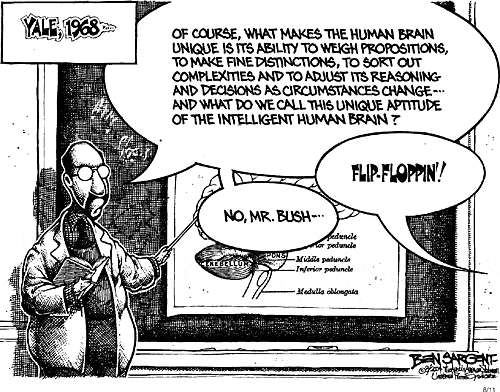 I thought this was highly amusing.
I thought this was highly amusing.
August 15, 2004
Bushisms are Fun!
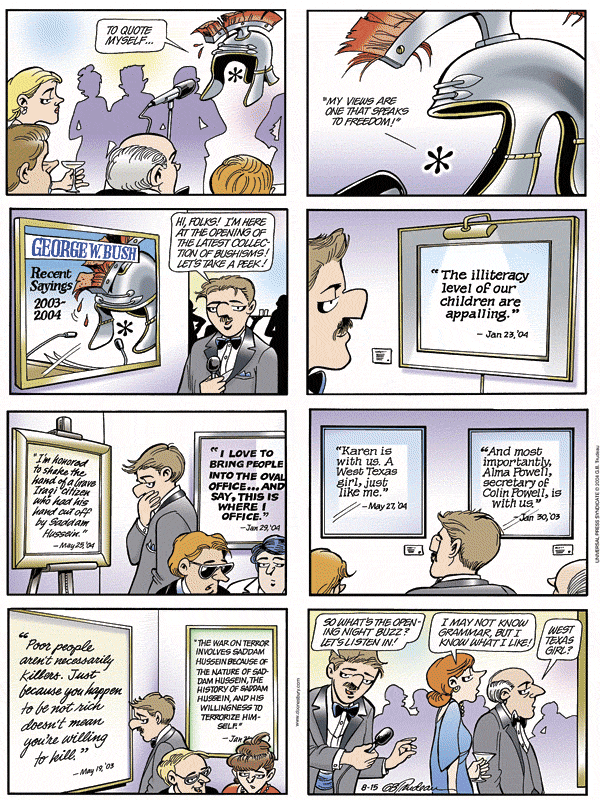
August 17, 2004
The Top 20%

September 20, 2004
The Economy of Tax Cuts
I found this link that explains the cost of Bush’s tax cuts in terms everyone can understand. Here’s a quickie: for 2% of the cost of the tax cut, first responders across the country (firemen, ambulences, police, etc.) could be better supported in their ability to prevent and respond to acts of terrorism. Good thing we got that tax cut out of the way, eh? Note, this link is from the great state of Washington, so some of it’s information is specific to Washington.
September 21, 2004
Bush during Vietnam *Updated*
Originally authored on: 2004-08-23 01:52:12 I really find this whole thing rather irritating. I honestly don’t care what Bush was doing during Vietnam. If he was in Vietnam, that would be great. If he was in Arkansas, that would be great. If he was in Texas, that would be great.
The big issue is that we don’t know where Bush was. We’re pretty certain it wasn’t Vietnam, which is why he shouldn’t really say much about the war record of someone who was. I don’t think Kerry should say anything about Bush’s record in the Texas National Guard.
What I find distasteful is people who claim that there is proof that Bush was fulfilling his duties. The fact is, there isn’t. He may have been, and if he was, like I said, great. But there isn’t any documentation. Some would assert that because he got an honorable discharge, he must have fulfilled his duty. This is not necessarily true, as you can see.
Anyway, since it has come up multiple times, and it seems that no further evidence is forthcoming, I figure I ought to document the dumb thing. At the very least, so I can point to it when it comes up again, I’m going to document what I can.
A decent summary of the questions raised is posted here although as it’s from Salon, a known hotbed of liberalism, so some might doubt it’s veracity.
A website I haven’t seen before, but has a very complete record is one called “Calpundit” which has not only a record of the relevant issue, but also has scanned-in copies of many of the relevant documents. here here and here
The summary seems to be: there is no sufficient record or proof that Bush fulfilled his required duty in the Texas National Guard. This does not mean that he didn’t do it. This means that there is no proof that he did. Some have said if he released his pay stubs from that time period (assuming he kept them), then that would resolve the issue. To my knowledge, he has not done so.
If that isn’t sufficient documentation, and if I find or am directed to more info, I’ll add more. Help cataloging this crap is welcome and requested.
Update (8/24/2004): USA Today has a good summary of things thus far.
Update (9/7/2004): The Miami Herald has a report summarizing what is missing, and documenting the Allied Press (AP) lawsuit against the government to obtain the missing documents. According to the AP, there are five categories of missing documentation, as follows (this is quoted from the article):
- A report from the Texas Air National Guard to Bush’s local draft board certifying that Bush remained in good standing. The government has released copies of those DD Form 44 documents for Bush for 1971 and earlier years but not for 1972 or 1973. Records from Bush’s draft board in Houston do not show his draft status changed after he joined the guard in 1968. The AP obtained the draft board records Aug. 27 under the Freedom of Information Act.
- Records of a required investigation into why Bush lost flight status. When Bush skipped his 1972 physical, regulations required his Texas commanders to “direct an investigation as to why the individual failed to accomplish the medical examination,” according to the Air Force manual at the time. An investigative report was supposed to be forwarded “with the command recommendation” to Air Force officials “for final determination.”
Bush’s spokesmen have said he skipped the exam because he knew he would be doing desk duty in Alabama. But Bush was required to take the physical by the end of July 1972, more than a month before he won final approval to train in Alabama. - A written acknowledgment from Bush that he had received the orders grounding him. His Texas commanders were ordered to have Bush sign such a document; but none has been released.
- Reports of formal counseling sessions Bush was required to have after missing more than three training sessions. Bush missed at least five months’ worth of National Guard training in 1972. No documents have surfaced indicating Bush was counseled or had written authorization to skip that training or make it up later. Commanders did have broad discretion to allow guardsmen to make up for missed training sessions, said Weaver and Lawrence Korb, Pentagon personnel chief during the Reagan administration from 1981 to 1985.
“If you missed it, you could make it up,” said Korb, who now works for the Center for American Progress, which supports Kerry. - A signed statement from Bush acknowledging he could be called to active duty if he did not promptly transfer to another guard unit after leaving Texas. The statement was required as part of a Vietnam-era crackdown on no-show guardsmen. Bush was approved in September 1972 to train with the Alabama unit, more than four months after he left Texas.
Update (9/9/04): According to a new FactCheck document Three new things have come to light (much of this text (the text in italics) is directly lifted from the FactCheck document, though FactCheck has more references, more details, is better documented, and doesn’t have my editorializing):
- A Boston Globe report Sept. 8/ concluded that Bush “fell well short of meeting his military obligation” because of irregular attendance at Guard drills. The Globe said Bush’s superiors “could have disciplined him or ordered him to active duty in 1972, 1973 or 1974. But they did neither.” The Whitehouse, understandably, contests this conclusion.
- The Associated Press reported Sept. 8 that newly obtained records show Bush’s Texas unit continued operating the type of airplane that Bush was trained to fly until 1974, long after Bush’s last flight in April 1972. Bush aides once suggested that a reason he stopped flying and later skipped a flight physical, leading to his official grounding, was that his services weren’t needed because the F-102 Delta Dagger planes were being phased out.
- The CBS program 60 Minutes planned to air an interview Sept. 8 with former Texas Lt. Gov. Ben Barnes, who says he used his political influence to get Bush into the Texas Air National Guard in 1968, when the Vietnam war was raging. Barnes says he did the same for a “lot of wealthy supporters and a lot of people who had family names,” and is now “very ashamed.” This, I feel, is neither here nor there. Bush got into the National Guard because his dad was a big-shot politician. All those who are surprised, please identify yourselves for further ridicule. Turns out, very few people like the draft, and most folks were doing their best to avoid it. Bush had the influence to avoid the Draft in a way that was very non-dangerous and completely legal (as far as I know, legal, anyway). Who wouldn’t take that opportunity? And it quite possibly could have been done without Bush Jr’s knowledge. What father wouldn’t try to keep his kids safe if he could? But, it does nobody any good to pretend that Bush getting into the National Guard (a very popular alternative to the draft, for obvious reasons) was just “the luck of the draw.” I mention it here only because FactCheck does, and because I’ve heard this kind of crap argument before.
This complements the previous, and more complete article at FactCheck. It essentially points out that while documents are fairly suggestive that Bush was where he said he was, but are not conclusive.
Update (9/13/04): More discussion of how much you can get away with and still be honorably discharged here.
Update (9/21/04): It appears that Bush’s records were tampered with.
Update (9/28/04): Another summary, this time by the LA Times. Summarized here: One key point of the article is that Bush did not meet one set of obligations as a Guardsman: the training minimum for members of the Ready Reserve. (Guard members are also in the Ready Reserve, which has a different set of attendance standards than the Guard.) And addressing the issue of Bush’s failure to take a flight medical exam, the article notes that an “array of Guard officials…said they could not recall another pilot who skipped his mandatory medical exam.” Ret. flight surgeon Jerry Marcontell, who was the flight surgeon for Bush’s air wing, said, “There were cases where they’d be a few weeks late because their regular jobs might get them in a bind. But I don’t remember anyone missing a physical for months at a time. Certainly not a year.” Bush’s aides have provided varying and contradictory explanations why he did not take that exam and was subsequently grounded. Still, the Mystery of the Missing Exam remains, well, a mystery. Now why can’t Bush clear that up?
September 22, 2004
Spelling

September 26, 2004
They Knew
I was doing some research for an email to a friend of mine, and came across the In These Times magazine (http://www.inthesetimes.com), and their August 2004 cover story: They Knew…
Holy shit.
What you will find in there is an extremely well documented, thoroughly researched record of when the Bush administration found out that their justification for war was bogus, and what they said about it (here’s a hint: they found out before they said anything, in most cases).
September 28, 2004
The New Paradigm
As Stewart says, “You do not want the new paradigm wrapped around your nuts.”
I found this on www.dearjonstewart.com. I think their petition is silly (who the heck looks to a comedian to make your decision for you?), but the Daily Show is awesome, and this is an excellent clip.
(local copy here just in case that one disappears)
Gas Prices
I found this interesting. If you think gas prices are high now, see what they were like back in the day (e.g. the 70’s), adjusted for inflation. Check it out:

I found it here
October 5, 2004
The Ol' Flip-Flopper
Back in 1992, while Bush Sr. was being criticized for leaving Saddam in power in Iraq instead of crushing him like the bug he is, Cheney came to his defense, saying that capturing Saddam wouldn’t be worth additional U.S. casualties or the risk of getting bogged down in the problems of trying to take over and govern Iraq.
Good thing he’s been so resolute about that one.
The real question: has Saddam become more powerful since Cheney’s 1992 assessment? Yes 9/11 changed everything, but what did it change about Iraq (given that Iraq has no connection to 9/11, as determined by the 9/11 Commission in America and the Lord Butler Report in the UK). Well… since Cheney still thinks Iraq and al Qaeda are linked I suppose he would say he’s been consistent. But… isn’t that just more evidence that he’s completely bonkers?
Die Bold
Remember Diebold? They were the company that supplied California with a whole bunch of electronic voting machines, and then were caught doing all sorts of unethical things like install illegal software on the voting machines (illegal because that software is legally required to be inspected and approved by the state). They were prosecuted for that illegal activity (that prosecution is still pending). Now a high-ranking Diebold executive quit his job at Diebold to go to work for the state of California, as the man in charge of voting machines.
Can you say “conflict of interest”?
Wrong On Defense
This is from This Modern World. I found it sufficiently amusing:
- “I believe demolishing Hussein’s military power and liberating Iraq would be a cakewalk.”—Defense Policy Board Member Ken Adelman, 2/13/02
- “Simply stated, there is no doubt that saddam hussein now has weapons of mass destruction.” —Vice President Dick Cheney, 8/26/02
- “We do know that (Saddam) is actively pursuing a nuclear weapon.” —National Security Advisor Condoleezza Rice, 9/10/02
- “It is not knowable how long that conflict would last. It could last, you know, six days, six weeks. I doubt six months.” —Secretary of Defense Donald Rumsfled, 2/7/03
- “My belief is we will, in fact, be greeted as liberators.” —Cheney, 3/16/03
- “We’re dealing with a country that can really finance its own reconstruction, and relatively soon.” —Deputy Secretary of Defense Paul Wolfowitz, 3/27/03
- “We know where (the weapons) are. They’re in the area around Tikrit and Baghdad and east, west, north and south somewhat.” —Rumsfeld
- “Iraq will not require sustained aid.” —O.M.B. Director Mitch Daniels, 3/28/03
- “Major combat operations have ended.” —President George W. Bush, 5/1/03
- “A year from now I’d be surprised if there’s not some grand square in baghdad that is named after President Bush.” —Former Pentagon Advisor Richard Perle, 9/22/03
October 11, 2004
The Press, Pressed
I recently found this article, pointing out the absurdities of press coverage of the election, and comparing idiots in an attempt to crown the lord-high nincompoop.
If there’s one criticism of the campaign press that has really held true all across the board throughout this race, it’s this tendency to kid-glove politicians, make excuses for them, make them seem more legitimate than they really are. It is important for the public to remember that a campaign reporter who would call the campaign a bogus, shallow farce—who would say, for instance, that the campaign is a mindless exercise in mudslinging diversion held between a pair of toothy millionaires with nearly identical plans for the management of the country—is also saying that his own job is bogus. Therefore the opposite instinct is usually in evidence in campaign coverage. The race is described as something profound, a true clash of ideals, led by two worthy men of unfathomable depth of character.
Thus you will sometimes see a situation where Bush will get up on stage and stumble around for 20 minutes like a man who’s been breathing out of a bag for a year—and when it comes time to actually describe the things he says, someone like Philip Gourevitch will call him a “master of the American vernacular.”
October 14, 2004
Segregation's Last Stand?
Alabama’s constitution currently enshrines school segregation. They’re going to vote to get rid of it. But let’s not assume that just because the state’s constitution’s statute has been declared unconstitutional a LONG time ago that ridding it of thee illegal pieces will be easy. The ever-popular Justice Moore (famous for refusing to remove the 10 Commandments from his court room) is trying to convince people to leave the statute in there. Why? He says that Alabama is currently disobeying federal law, and is not funding black schools as well as it is white schools, and if this part of Alabama’s constitution was revoked, it would amount to a massive tax increase for Alabama’s citizens.
I’m just aghast.
October 16, 2004
Stewart on Crossfire
Crossfire invited Jon Stewart on to talk about his new book, and he took them to task for being, in his words, “partisan hacks”.
My god, I have an unbelievable amount of respect for this man.
http://homepage.mac.com/duffyb/nobush/iMovieTheater231.html
( local, high-res copy is here (84MB) - you may need to download the 3ivx and DIVX video codecs to view it. )
October 20, 2004
Stewart Follow-up
TheStar.com has a decent followup to Jon’s appearance on Crossfire. Here too is Stewart’s own followup on the Daily Show.
(the following is mostly from an email that I sent)
Crossfire is an interesting show to start a crusade on (if that’s indeed what he’s doing) because it’s probably more like what Jon would like to see than not. I mean, if you’re out to call someone a political hack on a debate show, you’d be far closer to the mark if you did so on something like Fox’s Hannity & Colmes (Hannity’s a douchebag and Colmes is a wuss). But on the other hand, if you’re going to go somewhere to call the media on it’s rather blatant mis-handling of important political news, you need to do it somewhere where people will not simply quickly go to commercials and escort you off stage as soon as they realize what you’re up to.
I don’t know much about Tucker Carlson—when I watched Crossfire, it was Novak that was the regular contributor, and he really is a douche-bag (hey, he published the whereabouts and identity of an undercover CIA operative: major doucheitude). But in terms larger than just Crossfire, I think he’s got a perfectly valid point about where media is going these days. I mean, when, for example, fact-checking the political debates, the media figures will research and find 3 problems with Kerry and 3 problems with Bush and call it “balanced”—when in fact, the three problems with Kerry are not knowing Pell grants, not knowing that Bush did meet with the Congressional Black Caucus once, and having left the word “projected” out of one of his sentences about the surplus in the budget in 2000, and the problems Bush had were lying about the recipients of his tax cuts, lying about his position on the man who attacked the United States (Osama), and taking credit for protecting Americans from contaminated vaccine when it was in fact the British who protected Americans. They’re NOT equal gaffes! And more than that, the media doesn’t even have reasoned discussions about the pros and cons of the actual policy suggestions. Instead they prefer to focus on the facial expressions (Gore in 2000 and Bush in 2004) and similar ancillary crap (Mary Cheney, for example).
I think Jon’s point is that, regardless of how “balanced” Crossfire may seem to be, they aren’t actually providing much of a service to their viewers, they’re just providing entertainment. One side goes “rah! rah! you suck!” and the other side echoes it back—nobody’s mind is actually convinced or changed. At best, you’re simply aware of a headline you weren’t before—and if that’s all you want, you can watch Jon’s show to get the same thing. Jon gets away with simply listing headlines and making fun of them, because his show is on Comedy Central, whereas more mainstream news outlets, like CNN, have more of a responsibility to be actually useful. (It may be a fair argument to say that CNN’s responsibilities are to it’s investors, and it should show whatever to maximize their income, but let’s be honest: the porn industry pays better, and really maximising their income would result in something like Naked News. If they refuse to stoop that low, then they must have some other agenda than pure money.)
Politicians go on shows based on reputation, and what it will do for them. I think (and this is just my, very obviously whacked out, opinion) that if a show developed a reputation for scrupulous attention to detail, absolute honesty, and religious devotion to manners and aversion to personal attacks or other debate fallacies, then a politician’s willingness to go on such a show would be a benchmark of honesty and openness, and they’d do very well. And when they don’t have guests, they can reasonably discuss the issues amongst the regular contributors. This Week with David Brinkley, back in the early nineties was just that kind of show, I think (the show has since gone downhill)—but maybe I was just young and impressionable. Crossfire is an interesting case, because it was designed specifically for little more than one- or two-line zingers, shouting over each other, with no real mandatory fact-checking except what the hosts decide to do to call the other on it (so, only fact check it it’s really important to your argument that the other guy was fibbing). I really doubt that they could really change much, which is why I think (and hope) that Jon was simply using it as a platform to launch a more fundamental crusade for quality journalism.
It disturbs me that people no longer (can?) trust the media to actually do factual reporting. Everyone has a spin, a slant, whether they admit it or not and these days one has to either admit that you only want to hear one side, or you have to go out and seek a dozen or more sources in order to get anything even approximating a balanced view. That’s crap! I don’t want to have to do the research—that’s what the news agencies are for. Why on earth should I have to go to several different news agencies and read several different stories about the same event just to be sure that I know all of the major facets of that event? I mean, there ought to be some bigger distinction between Al Jazeera and Fox News or CNN than simply political leanings and budget size! And we’re sliding in that direction, sadly. And I can understand why we might be sliding in that particular sad direction—in my email conversations with people I disagree with, the conversation starts out reasoned, but by not carefully monitoring the contents of the conversation, over time it degenerates into name-calling and “well, you’re guy sucks even more” arguments instead of real substantive discussion. Quality political discussion is really hard, and factual reporting is even harder. Its success is largely based on reputation, which takes a long time to build (particularly in this day and age of widespread suspicion of talking heads).
While I don’t know what Crossfire can do about it—probably nothing in the short term—I think it’s a valid criticism of the media that many people are recognizing, and it should be addressed (we’ll need some real strong editors with thick skin, spine, balls of iron, and a herculean sense of journalistic ethics). I dearly hope that Jon is actually going to work for that goal, and that it wasn’t a one-off to get some laughs while being rude to another show.
My observation was that while I watched him say that I was thinking “oh my god, he’s saying what I’m sure everyone is thinking”. I mean, the audience was laughing their asses off, and they were there because they LIKE the show! Perhaps they recognized that they were attending more for the theatre of it than to actually hear something that might convince them to change their minds on some topic?
October 21, 2004
Creationism and the Grand Canyon
You read that right. Here’s the first paragraph from the article:
The Bush Administration has decided that it will stand by its approval for a book claiming the Grand Canyon was created by Noah’s flood rather than by geologic forces, according to internal documents released today by Public Employees for Environmental Responsibility (PEER).
Sure, the article was probably written by a bunch of tree-huggin’ hippies, but… come on.
October 22, 2004
NYTimes Endorses Kerry
Now, I will be the first to say that Kerry isn’t the first candidate that comes to my mind as the fellow I want as the next president. I am entirely unimpressed by his vote on the Iraq war. I’m not talking about the second vote on funding—-I agree with his stance there, and I don’t know if he voted against the second iteration of the bill on principle or not, but it doesn’t matter to me, because he proposed the first iteration of the bill (read: the version that actually made sense, in that it funded the war by repealing tax cuts for the wealthy). What I’m unimpressed with is his vote to authorize the president to use force in Iraq, combined with his explanation for it and subsequent distaste for the war. Either he’s deluding himself, or he changed his mind, or he’s a political opportunist. Did he really think that giving Bush the authority to use force in Iraq if he felt like it meant that Bush would only use it as a threat? Like hell. I see his point, and I raise him a baloney.
On the other hand, I despise Bush. I think he encourages unthinking, uninformed, blind followers with his unthinking, uninformed, blind leadership. He’s been a dick about education, stem cell research, science, and the environment, to name just a few things.
The Bush White House has always given us the worst aspects of the American right without any of the advantages. We get the radical goals but not the efficient management. The Department of Education’s handling of the No Child Left Behind Act has been heavily politicized and inept. The Department of Homeland Security is famous for its useless alerts and its inability to distribute antiterrorism aid according to actual threats. Without providing enough troops to properly secure Iraq, the administration has managed to so strain the resources of our armed forces that the nation is unprepared to respond to a crisis anywhere else in the world. [1]
On the third hand, I’m impressed with Kerry’s performance in the debates, and I appreciate that he was one of the first politicos to recognize the potential for trouble in international organizations without country bonds—-he saw it in the drug war, and wrote a book about it in 1992 or so.
Mr. Kerry has an aggressive and in some cases innovative package of ideas about energy, aimed at addressing global warming and oil dependency. He is a longtime advocate of deficit reduction. In the Senate, he worked with John McCain in restoring relations between the United States and Vietnam, and led investigations of the way the international financial system has been gamed to permit the laundering of drug and terror money. He has always understood that America’s appropriate role in world affairs is as leader of a willing community of nations, not in my-way-or-the-highway domination. [1]
And, on top of that, I have a generally liberal social view, and Bush irritates the hell out of me on that front (gays, women, education, separation of church & state, etc.).
(NOTE: I am ignoring the war here. I despise the invasion of Iraq, always have, but now that we’ve gone and done the stupid invading we need to clean it up and not jump ship as soon as they have elections.)
I heard a while ago that the New York Times had endorsed Kerry for president, but I just recently found the text of the endorsement. I think they phrase it exactly the way I was thinking, and more. Go NYT!
This is the second-to-last paragraph, which I particularly like:
We look back on the past four years with hearts nearly breaking, both for the lives unnecessarily lost and for the opportunities so casually wasted. Time and again, history invited George W. Bush to play a heroic role, and time and again he chose the wrong course. We believe that with John Kerry as president, the nation will do better. [1]
Reality-based Viewpoints
One of the more typical accusations that Kerry supporters will make against Bush supporters in moments of pique is that Bush supporters simply do not live in a world of reality. Of course, this is part of a series of name-calling and nasty personal attacks in both directions, and nobody wins.
Interestingly, a new study has come out that lends some weight to this particular personal attack. Now, I’d like to state right up front that I don’t generally subscribe to this position, and at worst I blame the leadership for misleading (lying) to the rank and file… but it certainly is an interesting result. Remember, this speaks to the statistical average, and not any particular Republicans by name.
Even after the final report of Charles Duelfer to Congress saying that Iraq did not have a significant WMD program, 72% of Bush supporters continue to believe that Iraq had actual WMD (47%) or a major program for developing them (25%). Fifty-six percent assume that most experts believe Iraq had actual WMD and 57% also assume, incorrectly, that Duelfer concluded Iraq had at least a major WMD program. Kerry supporters hold opposite beliefs on all these points.
Why do you suppose this is? Why do such large segments of the population believe factually incorrect things?
… how would the race for president look if everyone actually understood what the true facts of the matter were?
October 26, 2004
Faith-Based Voting
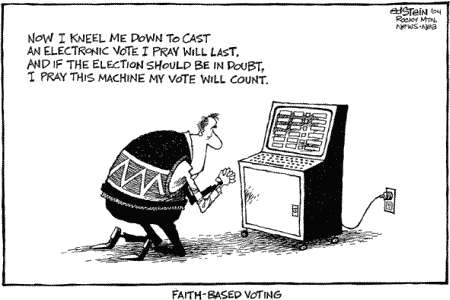
heh, it’s too true to be funny.
Eminem's Mosh
Eminem is attempting, like Howard Stern, to enhance his populist power, and encourage people to “vote the scoundrel’s out”. Proof? Here: ifilm or GNN or local copy
October 29, 2004
Why Bush Must Go (100 Facts)
In case you needed a reason to vote against Bush, here are 100 facts, backed up with sources. This is essentially a reprint of the “article” by Judd Legum on theNation.com which can be obtained as a PDF for easy dispersal. My comments on each are in italic. (click below for the full posting - it was a little too long for the front page)
Iraq
1. The Bush Administration has spent more than $140 billion dollars in a war of choice in Iraq. source: American Progress
War of choice? We were attacked… but not by Iraqis. Saddam, in fact, had nothing to do with Osama bin Laden (among other reasons, because Osama backed people trying to unseat Saddam).
November 4, 2004
Rush is a big fat idiot
And now the liberals want to stop President Reagan from selling chemical warfare agents and military equipment to Saddam Hussein, and why? Because Saddam ‘allegedly’ gassed a few Kurds in his own country. Mark my words. All of this talk of Saddam Hussein being a ‘war criminal’ or ‘committing crimes against humanity’ is the same old thing. LIBERAL HATE SPEECH! And speaking of poison gas … I SAY WE ROUND UP ALL THE DRUG ADDICTS AND GAS THEM TOO!
—Rush Limbaugh, November 3, 1988
Consider them marked, Mr. Limbaugh.
November 8, 2004
The NRA Is Wrong?
This article was recently brought to my attention, and makes some interesting points. The general gist is that, contrary to the NRA’s public stance, the Second Amendment does not guarantee individuals the right to bear arms. The second amendment is as follows:
A well regulated Militia, being necessary to the security of a free State, the right of the people to keep and bear Arms, shall not be infringed.
The NRA focuses on the second half of the amendment, and if that was all there was to it, the anti-gun-control position would be far more trivial, and surely most gun-control laws would be struck down the instant they were challenged. But that would be like saying that the 6th Commandment is “Murder!” even though the first half of the Commandment is “Thou shalt not”.
There are two pieces to the puzzle: first, does this affect federal law only or all law? (if it’s not just federal law, then all the Wild West “no carrying guns in town” stuff that we saw in movies was unconstitutional) Second, does this apply to any individual and any “arm”, or does it apply only to militia-related rights?
The Supreme Court has maintained over the centuries, starting with the United States v. Cruikshank decision in 1876, which essentially affirmed that the Amendment guarantees that States’ ability to maintain their own army (militia) independent of the Federal one will not be infringed upon by the federal government. Time and time again, the Supreme Court has reaffirmed this interpretation of the 2nd Amendment, most recently in 1980 (United States v. Miller). Additionally, former Chief Justice Berger denounced the NRA’s edited version of the amendment as a “fraud.” (Updated the preceeding sentence to make more sense.)
Bunch of liberal hippies rewriting the Constitution? Hardly.
Here’s the thing, though… I agree with Thomas Jefferson. Thomas Jefferson was deeply suspicious of corruption and overarching governmental power without oversight or responsibility. In the Declaration of Independence, Jefferson wrote:
That whenever any Form of Government becomes destructive of these ends, it is the Right of the People to alter or to abolish it, and to institute new Government, laying its foundation on such principles and organizing its powers in such form, as to them shall seem most likely to effect their Safety and Happiness. Prudence, indeed, will dictate that Governments long established should not be changed for light and transient causes; and accordingly all experience hath shewn, that mankind are more disposed to suffer, while evils are sufferable, than to right themselves by abolishing the forms to which they are accustomed. But when a long train of abuses and usurpations, pursuing invariably the same Object evinces a design to reduce them under absolute Despotism, it is their right, it is their duty, to throw off such Government, and to provide new Guards for their future security. (emphasis mine)
How can a people throw off such a Government if they have no weapons with which to do so?
Now, at the time that was written, the blunderbuss was one of the most powerful weapons, and was the primary means of fighting in an army (the only way to get more powerful was to add a horse to the equation). So, he would have seen “arms” as the method of the common man for throwing off the government, and I think it is important to maintain that, if only symbolically. On the other hand, the federal government has Apache helicopters and Abrahms tanks, and if you think you’re overthrowing the government with some sidearms, you’re sorely mistaken.
But, both I and the NRA really don’t seem to have any constitutional standing.
Extra bonus question: Why should people be allowed to have guns? Or, put another way, why shouldn’t people be allowed to have guns? Come up with a logical answer that doesn’t involve the Constitution or a “it’s for your own good” argument, and you get a cookie.
December 1, 2004
Sheep

March 13, 2005
Social Security Privatization
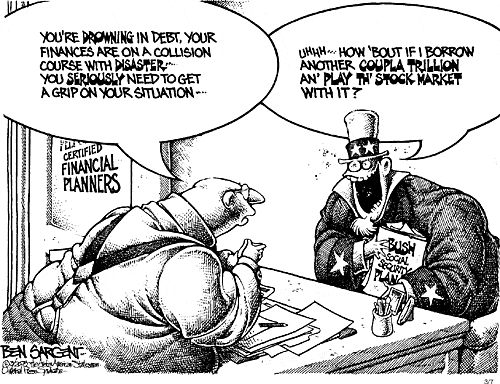
March 17, 2005
Abortion-only
I know… I should actually comment rather than just posting cartoons. Oh well. It’s my blog. :P
March 19, 2005
Back of a Volkswagon
I found this in the Washington Post and thought it was interesting:
Teenagers who take virginity pledges—public declarations to abstain from sex—are almost as likely to be infected with a sexually transmitted disease as those who never made the pledge, an eight-year study released yesterday found.
Although young people who sign a virginity pledge delay the initiation of sexual activity, marry at younger ages and have fewer sexual partners, they are also less likely to use condoms and more likely to experiment with oral and anal sex, said the researchers from Yale and Columbia universities.
“The sad story is that kids who are trying to preserve their technical virginity are, in some cases, engaging in much riskier behavior,” said lead author Peter S. Bearman, a professor at Columbia’s Institute for Social and Economic Research and Policy. “From a public health point of view, an abstinence movement that encourages no vaginal sex may inadvertently encourage other forms at sex that are at higher risk of STDs.”
April 9, 2005
Pope John Paul II on Iraq
Just so I don’t forget… as described here back in March, 2003:
President Bush, fresh from making plans for war against Iraq, met for 40 minutes Wednesday with Cardinal Pio Laghi, an emissary from the Vatican who made a last appeal for peace.
A friend of the president’s father and the Vatican’s first ambassador to Washington, Laghi brought to the White House the moral authority of the Roman Catholic Church on Ash Wednesday. In Rome, meanwhile, Pope John Paul II called on the world to fast for peace.
Laghi, 80 years old and retired from the Vatican, said after his meeting with Bush that a war would be “illegal and unjust,” but stopped short of calling it immoral. In a news conference at the National Press Club, he also said the United States had an obligation to seek the blessings of the United Nations.
That’s before the invasion.
That envoy, by the way, referred to the war as “immoral”, but the Pope did not, at least as indicated by this Catholic News article. Or at least, it’s a little fuzzy what exactly the pope said:
Laghi came bearing the pope´s message: A war would be a “defeat for humanity” and would be neither morally nor legally justified.
In a letter to Bush, the pope stood by his view that a pre-emptive strike on Iraq is immoral “unless it gets backed” by the United Nations.
Note that this was not reported in much more mainstream. Media Matters quotes the Dallas Morning News as saying:
One of the strongest anti-war voices belongs to the pope. He sent an envoy to visit with Mr. Bush this month with a letter that called the war ‘immoral, illegal, unjust.’
But they don’t have a link to the story.
May 9, 2005
Breaking Glass
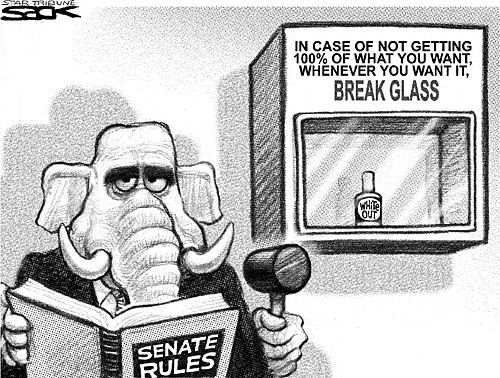
May 21, 2005
Judicial Nominees
Good statistics here
July 16, 2005
Taking the Fight to the Enemy
I thought this was amusing.

September 9, 2005
Rehnquist
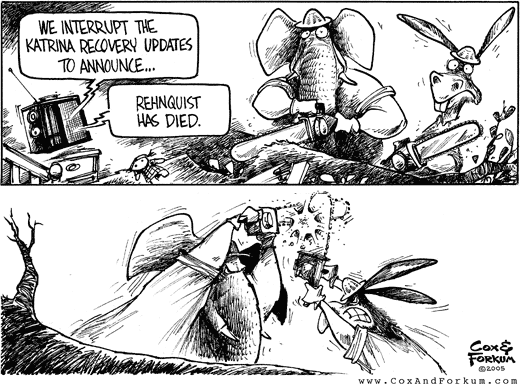
September 12, 2005
Mike Brown
Mr. Brown, head of FEMA, has recently come under fire for having a slightly goofy resume. What’s the deal? Well, according to a Whitehouse Press Release he worked for the city of Edmond, Okla., from 1975 to 1978 “overseeing the emergency services division.” In fact, according to Claudia Deakins, head of public relations for the city of Edmond, Brown was an “assistant to the city manager” from 1977 to 1980, not a manager himself, and had no authority over other employees. “The assistant is more like an intern,” she told TIME. “Department heads did not report to him.”
Which is why this is amuses me so much:
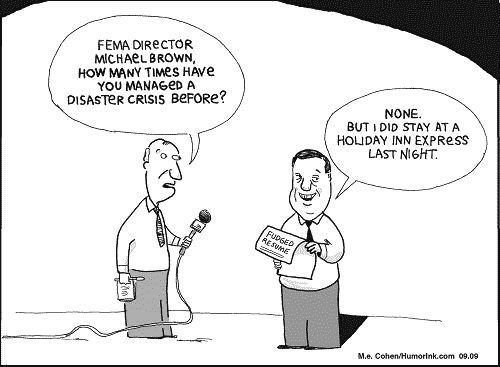
September 21, 2005
Conservativism
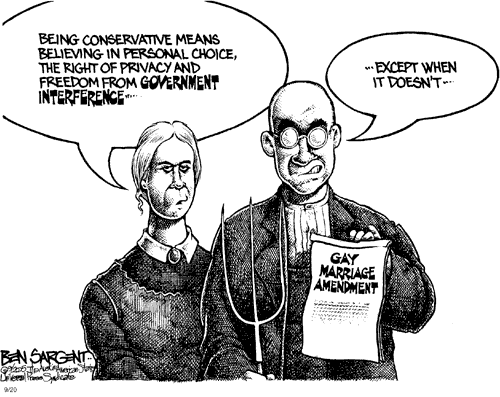
October 2, 2005
Shouting Match

November 19, 2005
HA! Now you're addicted to Crack!
My favorite flavor of crack. :)
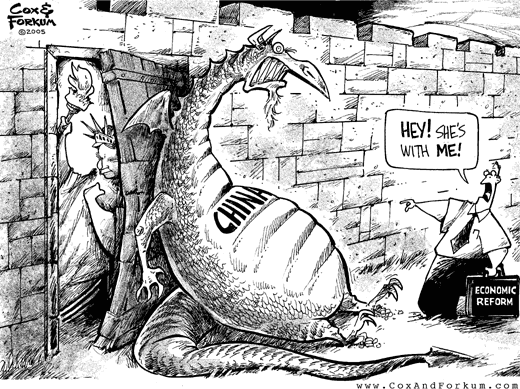
February 2, 2006
Hamas

February 6, 2006
Jed Bartlet Quotes
These are excellent, but just too long to add to my email collection:
First, on drugs:
I inherited the war on drugs from a President, who inherited it from a President, who inherited it from a President before that. I’m not one hundred percent sure who we’re fighting, but I know we’re not winning. Ten years ago, we spent five billion dollars fighting drugs, and we did such a good job that last year, we spent sixteen billion. Sixty percent of federal prisoners are in jail on drug charges as opposed to two and a half percent that are there for violent crime. We imprison a higher percentage of our citizens than Russia did under communism, and South Africa under apartheid. Somewhere between fifty and eight-five percent of the prison population has a drug or alcohol abuse problem. We’ve tried just say no; I don’t think it’s gonna work.
Then, on partisanship:
Partisan politics is what the Founders had in mind. It guarantees that the minority opinion is heard, and as a lifelong possessor of minority opinions, I appreciate it. But if you’re troubled by it, Governor, you should know in this campaign, you’ve used the word liberal 74 times in one day. It was yesterday.
February 22, 2006
Tax Cuts
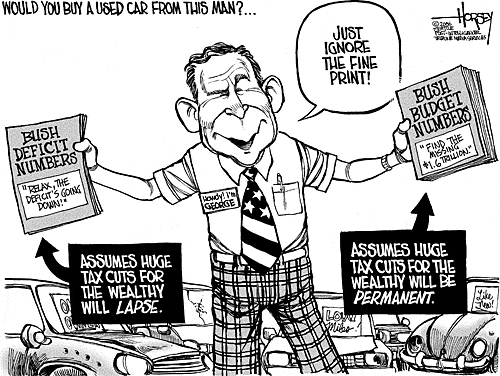
March 23, 2006
Waterboarding and Torture
I’ve heard a lot about the so-called “torture-lite”, and conservatives telling me that it isn’t torture unless you’re ripping out people’s fingernails, and so forth.
And then, I found this very interesting description. This is from the trial, after World War II, of a Japanese interrogator.
Q: What other physical treatment was administered to you at that time?
A: Well, I was given what they call the water cure.
Q: Explain to the Commission what that was.
A: Well, I was put on my back on the floor with my arms and legs stretched out, one guard holding each limb. The towel was wrapped around my face and put across my face and water was poured on. They poured water on this towel until I was almost unconscious from strangulation, then they would let me up until I’d get my breath, then they’d start over again.
Q: When you regained consciousness would they keep asking you questions?
A: Yes sir they did.
Q: How long did this treatment continue?
A: About twenty minutes.
Q: What was your sensation when they were pouring water on the towel, what did you physically feel?
A: Well, I felt more or less like I was drowning, just gasping between life and death.”
And the CIA’s practice?
“The prisoner is bound to an inclined board, feet raised and head slightly below the feet. Cellophane is wrapped over the prisoner’s face and water is poured over him. Unavoidably, the gag reflex kicks in and a terrifying fear of drowning leads to almost instant pleas to bring the treatment to a halt.”
Is that torture? Back at the trial of the Japanese interrogator, they dismissed charges (what charges?) against the serviceman giving testimony because:
The untrustworthiness of any admissions or confessions made under torture would clearly vitiate a conviction based thereon.
April 5, 2006
Iraqi Lawnmower
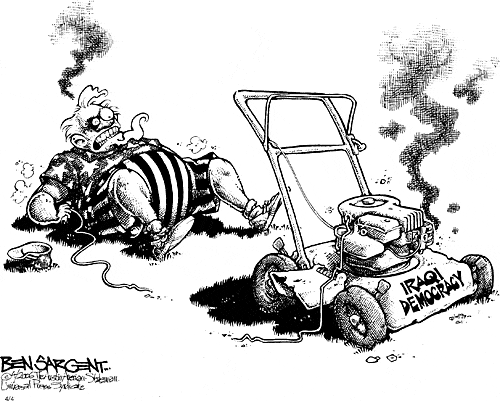
June 30, 2006
Flag Burning Countries
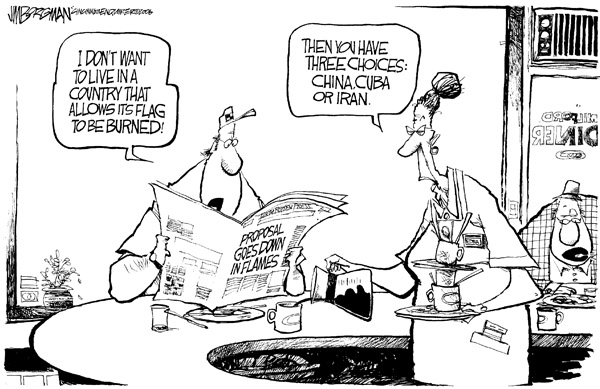
July 12, 2006
Immigration

August 13, 2006
The Myth of Redemptive Violence
I found another great editorial at the National Catholic Review. They do a bit of quoting from a Protestant theologian:
The myth of redemptive violence, writes Wink in The Powers That Be: Theology for a New Millennium, “speaks for God; it does not listen for God to speak. It invokes the sovereignty of God as its own; it does not entertain the prophetic possibility of radical judgment by God. It misappropriates the language, symbols and scriptures of Christianity. It does not seek God in order to change; it embraces God in order to prevent change. Its God is not the impartial ruler of all nations but a tribal god worshiped as an idol. Its metaphor is not the journey but the fortress; its symbol is not the cross but the crosshairs of a gun. Its offer is not forgiveness but victory. … It is blasphemous. It is idolatrous.
“And it is immensely popular.”
It is difficult to be the shining city on the hill when so much of our effort and treasury and youth is mired in blood-soaked sand.
The full text is in the extended entry until they ask me to remove it (the article is available for free, currently).
December 9, 2006
Rush Lies Intentionally, and Admitted It (Sorta)
At this point, this is old news. But I recently had reason to think about it again, and wanted some sort of reference as to the specifics, so I’m adding them here, for posterity’s sake.
The claim is that Rush Limbaugh does not believe what he says. The “proof” is here (that’s rushlimbaugh.com, his own personal website, the transcript dated November 8th, 2006). Here’s the relevant quote from Rush’s page, just in case he ever changes it:
The way I feel is this: I feel liberated, and I’m going to tell you as plainly as I can why. I no longer am going to have to carry the water for people who I don’t think deserve having their water carried. Now, you might say, “Well, why have you been doing it?” Because the stakes are high. Even though the Republican Party let us down, to me they represent a far better future for my beliefs and therefore the country’s than the Democrat Party and liberalism does.
So what does “carrying the water” for someone mean? Limbaugh explains:
There have been a bunch of things going on in Congress, some of this legislation coming out of there that I have just cringed at, and it has been difficult coming in here, trying to make the case for it when the people who are supposedly in favor of it can’t even make the case themselves — and to have to come in here and try to do their jobs. I’m a radio guy! I understand what this program has become in America and I understand the leadership position it has. I was doing what I thought best, but at this point, people who don’t deserve to have their water carried, or have themselves explained as they would like to say things but somehow aren’t able to, I’m not under that kind of pressure.
So… the Republican party would do things that Limbaugh didn’t approve of, and rather be honest about it, he would go on the air and pretend that he did approve. Is that lying? Limbaugh’s producer (Bo Snerdley) became worried and interrupted for a moment to ask him about it. Limbaugh responded:
No, I’m not lying. Snerdley’s concerned. I’ve not lied about anything I’ve said. Let me try this a different way. (sigh) I’m going to have to think about this. I tried to make it as clear as I can. I’m not going to eat my own, and I’m not going to throw my own overboard, particularly in a campaign, and particularly when the country is at war — and I’m not going to do it for selfish reasons, and I’m not going to do it to stand out, and I’m not going to do it to be different. I’m not going to do it to draw attention from our enemies. I’m not going to do anything I do so that the Drive-By Media will like me or think that, “Ooooh, Limbaugh has changed! Ooooh, Limbaugh is coming around!” That’s not my thinking. …
It has been a challenge to come in here and look at some of the weaknesses and some of the missed opportunities and try to cover for them and make up for them and make sure that the opportunities are not totally lost. But at some point you have to say, “I’m not them, and I can’t assume the responsibility for their success. It isn’t my job to make them succeed. It isn’t my job to make elected Republicans look good if they can’t do it themselves. It’s not my job to make them understandable and understood if they can’t do it themselves — not in perpetuity, not ad infinitum.” So all I can tell you is I feel a little liberated, and I think this is all going to result in a lot of cleansing in a number of areas.
Translation: I’m a mouthpiece for the Republican Party, and while I sit here and say things to advance the Party, I don’t believe them. But that’s not lying. That’s just repeating things I don’t believe as if I believed them. It may imply that I believe them, but since I never said I did, it’s not lying.
No, maybe not lying. There’s another more polite word for it: acting.
How long as this been going on, then?
There hasn’t been any ideology in the Republican Party, any conservatism, for at least two to maybe four years. You could argue Bush was more of an ideologue in the presidential campaign of ‘04, but in looking at what happened yesterday, it wasn’t conservatism that lost.
So, if Limbaugh believes in conservatism, he’s been lying/acting for the past two, maybe four years.
Well, make your own decision about him. Obviously some folks don’t care whether or not he believes what he says or not. And I guess there’s a market for that. But if you’re looking for honest opinion, Limbaugh ain’t it.
P.S. I do recognize the silliness in using the words of a liar/actor to prove anything.
January 6, 2007
Turnabout
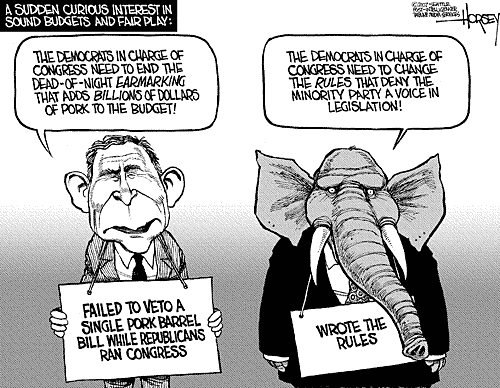
December 7, 2007
Health Coverage & Obama
I was recently pointed at an Op-Ed in the NYT by Paul Krugman called The Mandate Muddle that talks about Obama’s health care plan versus Hillary’s health care plan.
I must admit, I have difficulty understanding the whole “universal health coverage” thing. As I understand it, the way things currently work is that the advantage of health insurance is almost the same as every other kind of insurance: when something bad happens, you don’t take the huge financial hit. This is essentially equivalent to simply socking away money somewhere useful (a mutual fund, say) that you’ve specifically labelled as “health care money”, and whenever you need to pay for health care, you tap it. The primary difference being that if bad things happen that you don’t have enough for, insurance will cover it while your personal health account wouldn’t—and the reason it works that way is because rather than drawing on your own account, you’re drawing on (essentially) the combined purchasing power of everyone else that’s been chipping in to the same insurance company. Only, because it’s a company rather than an account, they have a fair bit of overhead involved in verifying claims and making sure people aren’t cheating. The next big detail, though, is that insurance companies negotiate lower rates with doctors: so they limit who you can go to, and they don’t have to pay as much as you would have to if you self-insured. So far, this all makes a fair bit of sense: by purchasing insurance, you mitigate your risk, at the expense of most likely paying more into the system than you ever get out. Probably quite a lot more (otherwise it wouldn’t be profitable for the insurance company). On the other hand, if you’re wealthy, maybe you aren’t so concerned about mitigating the risk, since you can stand to take the hit if and when you need health care.
So what’s the big goal with mandating universal insurance? By making sure that everyone is mitigating risk, we legally guarantee that the insurance companies have customers. And what happens? Do we get better health care? Does the cost of health care go down? Well, we may get better health care, because people will go to more regular check-ups. And that may cause the cost to go down (due to the whole “catch expensive problems before they become expensive” thing), but costs also go up because now hospitals can’t afford to give great prices to insurance companies and pass the buck on to the little guy without insurance. So what happens if you can’t afford to buy insurance?
If you can’t afford car insurance, these days, you just ride a bike (or you walk). But there’s nothing you can give up (short of committing suicide) if you can’t afford mandatory health insurance. So what happens? Legally, you’re required to buy it, so suddenly purchasing insurance gets put first on the list, in front of things like food, shelter, keeping the lights on, keeping the toilets working, etc. Krugman says this is a false claim, but on what grounds? Only that the government will subsidize it for people… meaning what, that the government will buy it for you? Forcibly make it cheaper? This sounds ripe for abuse, and unless the government is buying it for you, doesn’t actually solve the problem.
And the first false claim, that it’s unenforceable… the answer is Switzerland and the Netherlands? Surely that can’t be taken as proof positive. We’re talking about America here, a country that rejected Kyoto, a country that still has capital punishment, a country where people (mostly) don’t live close together and find it easy to ignore each other and revel in our ignorance and rudeness. And Krugman wants to compare this body of people to folks in Switzerland and the Netherlands? Countries known for their staunchly liberal politics? The citizens of America have a far different approach to “government mandates” than do citizens of Switzerland and the Netherlands.
Besides which, there is no enforcement mechanism in these plans. Whether or not it’s even possible to enforce such a mandate, there’s no provision for it in Hillary’s plan. For car insurance, you’re required to provide proof whenever you get pulled over by the cops. What happens for Hillary’s care? Nothing. If anything, Edwards’ plan has at least approached this aspect, as his plan requires people to show proof of insurance when they submit their tax returns. But I think Timothy Noah makes a good point when he says this:
Enrolling people in a private health care plan isn’t the hard part; forcing people to pay for a private health care plan is the hard part. Yes, the government has procedures to collect student loans and unpaid taxes, but it’s understood that such payments are obligations. There’s little disagreement that if you take out a loan, you’re obliged to repay it, and only slightly more disagreement (mostly among crackpots) that as a citizen you are obliged to share in the cost of government. I believe there would be a lot of disagreement about whether the government could compel you to buy a private health insurance policy.
If you want to drive a car, it’s accepted that you have to buy private auto insurance. But that’s conditional on enjoying the societal privilege of driving a car; you can avoid the requirement by choosing not to drive one. A mandate to buy private health insurance, however, would be conditional on… being alive. I can’t think of another instance in which the government says outright, “You must buy this or that,” independent of any special privilege or subsidy it may bestow on you. Even if such a requirement could pass muster in the courts—and I have my doubts—it seems to me that politically it would give the inevitable conservative opposition a nice fat target to rally around. Big Brother will steal your wages if you don’t buy a health insurance policy!
More importantly, he keenly observes the following:
It may be necessary to achieve the goal of expanding government-administered health insurance in stages. All the health care plans of the major Democratic candidates are premised on that assumption, whether they acknowledge it or not. The only Democratic candidate I’m aware of who dispenses with such gradualism is Dennis Kucinich, whose solution—“Medicare For All”—is the only one that will solve the health care mess in the long run. Clinton, Obama, and Edwards all have plans that would steadily enlarge the role of government health insurance. These are accommodations to political reality. I question the wisdom of including, within such an accommodation, a mandate that would render that accomodation unattractive to a large bloc of voters. If we’re going to create a ruckus, better to do it in the service of a more comprehensive solution than either Clinton or Edwards has put forth. If we aren’t, Obama’s resistence to an individual mandate makes perfect sense.
That being said, I’m with Krugman in being annoyed that Obama keeps making the claim that his health care plan covers everyone. The only thing I can imagine is that he must be playing some stupid semantic game: “covers everyone” (i.e. applies to everyone) versus “provides health care coverage for everyone”.
September 22, 2008
That's MY $700 Billion
I just want to share a little of what I’ve been reading, because I find it interesting.
For example, consider Bloomberg’s take on the candidates’ reactions to the latest financial news (namely, the $700 billion proposed bailout of the entire financial sector). Here’s a representative snippet:
[Bill] Donaldson, who was tapped by Bush to head the SEC, says Obama called him last year about the financial-regulatory problems. He has never heard from McCain.
“Obama has been talking about the need for better financial regulation well before this crisis hit and has done some real thinking about it,” says Donaldson, a lifelong Republican. “McCain comes across as someone who suddenly realized changes have to be made.”
Additionally, they compare the people that Obama and McCain turned to for advice. Both of them turned to three people for advice. Obama called three former Treasury Secretaries. Two are described as particularly effective (Rubin and Summers), and the third became a well-regarded chairman of the Federal Reserve (Paul Volcker — described as “towering”). McCain, on the other hand, called a Reagan administration adviser (Martin Feldstein) who was regularly cut out of the decision making process by Reagan’s chief-of-staff, a former undersecretary of the Treasury not known for doing much (John Taylor), and the former CEO of HP who was fired rather publicly and received $21 million from the golden parachute clause in her contract (Carly Fiorina). Bloomberg clearly prefers Obama’s choices.
And just when you thought fiscal conservatives would be mad enough about the government buying AIG ($75 billion) and bailing out Fannie Mae and Freddie Mac ($25 billion) and bailing out Bear Stearns so that JPMorgan would buy it ($29 billion), now comes the Big Bailout. Let me reformat that: the BIG BAILOUT. An order of magnitude bigger. The taxpayer is now on the hook for an additional seven hundred billion dollars. Let’s put that in perspective: according to President Bush’s budget, we’re expected to spend $659 billion on the oh-so-odious Social Security in 2008. The US Government total 2008 budget tips the scale at 2.931 trillion dollars, according to the Heritage Foundation, which means this bailout would be TWENTY THREE PERCENT OF OUR ANNUAL BUDGET!!! Imagine if a guy that makes $100k/yr (which amounts to $77k/yr after taxes, i.e. $6,416/month) suddenly had to spend $17,710. That’s what we’re talking about. Are you screaming yet?
Jared Bernstein has an article in the Huffington Post. Here we go:
You hear that implosion reverberating through financial markets? It’s the sound of decades of conservative ideology collapsing. … The week that just ended revealed the myth of market fundamentalism: the notion associated with mainstream, Milton Freidman’esque economics, and amplified by anti-government conservatives that unfettered markets will provide society with the best outcomes. Such simplicity, such elegance…such nonsense.
He has a list of what he calls “glaringly obvious truths” that I think is very worth reading.
Since you probably won’t go read that article, here’s a few key ones (and my reactions):
- Deregulated markets cannot police themselves; they tend toward speculation, vastly underpriced risk, and deeply damaging bubbles; (sounds accurate to me, given what we’ve seen; or perhaps it’s more accurate to say that deregulated markets DO NOT police themselves, even if they can)
- An economy that generates growth while leaving most families behind is a broken economy (ok)
- We can neither achieve broad prosperity nor compete globally without robust growth in key sectors which we have ignored or underfunded, including manufacturing, green production, and cradle-to-retirement public education; crafting evermore clever financial instruments will not pave the way to dependable, broadly shared growth (translation: creative accounting is no substitute for good fundamentals)
- No private sector firm should be too big to fail; any firm of that magnitude must be nationalized (I would say, rather than nationalized, “broken up”, but the question becomes: at what point do we know that a company is too big? And what kind of a disincentive for smart business practices does this become? It’s fun to say that too big is bad, but is the cure worse than the disease?)
- Capital markets are dysfunctional; borrowing and lending standards are ignored; lax capital requirements lead to constant over-leveraging; shadow accounts thwart transparency (that’s not a truism, that’s describing the current situation)
- We apparently can quickly find (or borrow) the money to do the stuff the authorities deem necessary, be it war or bailout; thus, we can also find the money we need for investment in people, from health care to education to infrastructure, etc. (typical complaint… and saying “we don’t have the money” is obviously a poor excuse. These discussions should go back to “should we do this”)
There’s more, but those are the most central to his point.
Is he saying that capitalism can’t work? Maybe. I disagree with such an extremist statement. But consider this: the current Treasury Secretary Paulson (whatever you think of him) said about this crisis: Raw capitalism is dead.
Another fellow, named Robert Borosage, puts it slightly differently in his article:
Call it extortion. Every American is now being told to ante up $2000 — an estimated $700 billion in all — to bail out the banks from their bad bets, or they’ll bring down the entire economy.
In the speculative frenzy that allowed the Masters of the Universe to pocket millions personally, the banks filled their coffers with toxic paper that no one wants to buy. Now they sensibly don’t want to lend money to each other, since no one knows if the other is solvent. So they go on strike, and threaten to trigger a global depression, if they don’t get rescued.
He then lists seven of his own suggestions, which are also worth reading. Granted, I don’t see how his fourth suggestion (curb excessive CEO pay) would do much more than make us all feel better, but the heart of the matter is: these guys ran their companies, along with anyone who depended on them, into the ground. They shouldn’t be allowed to profit. The government’s bailout money should, if used at all, be only used to keep the economy afloat. CEO golden parachutes should be considered just as forfeit as if the company went bankrupt. Because that’s what these companies are: BANKRUPT.
Does nobody else in the world get chills down their spine from just uttering that word?
I still want to know just what would happen if these companies were simply forced to sleep in the beds they’ve made for themselves. If AIG did such a bad job, what would happen if they simply went belly-up? Wouldn’t other folks in the market be forced to realize that they really DO need to perform due diligence? That there’s a REASON things are called risky? So people get fearful, so credit starts to be harder to get, so people stop investing in things they don’t understand… isn’t that a good thing? The fundamental problem here, that started this whole mess, is that they were being too free with the credit and loaned money to anyone with a pulse and never bothered checking whether it was a good idea to loan them money! Credit should be harder to get! People who can’t afford a house shouldn’t be buying one! And if you don’t know how risky an investment is or if you don’t understand where the return comes from DON’T BUY IT! There’s a shocking idea for you…
These people deserve to lose lots of money for making stupid decisions, and anyone who loaned those folks money (aka investors) won’t be getting it back. But we don’t want some sort of cascade to happen where nobody invests in anybody ever again. How can we make people learn their lessons without taking the stock market down with them? There are a lot of ordinary folks in the stock market these days, including ones that may not even realize it, due to their retirement accounts: the day of the pension has passed, and 401k’s rule the land. When the market goes down, they take the little guys with them.
Buying all of these bad investments, such that they now become OUR bad investments, seems like a bad idea (no matter whether it’s the government doing it or our mutual fund managers). What do we-the-people want with bad investments? We don’t! And yet, this bailout seems more like, as Bernstein puts it: privatizing the profits and socializing the losses. Oh goody, sign me up for that! You notice all the pro-deregulation folks are lining up behind this bailout, don’t you? It’s called voting yourself money. It’s also called “saving your own hide”… at everyone else’s expense.
September 30, 2008
The Bailout
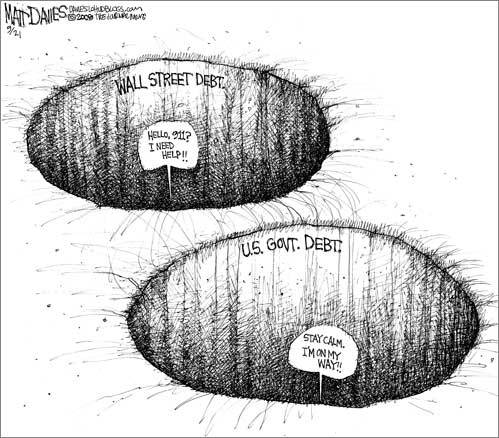
October 6, 2008
Congress's CRA Caused the Crash?
It’s recently been suggested to me that the true cause of the subprime mess is that Congress forced banks to loan to poor people (also known as “people who cannot afford to repay the mortgage”), perhaps under the guise of fairness or avoiding racism or classism or something like that.
There would appear to be some truth to this idea, but not like you’d think (surprise! it’s a complicated subject). Congress has indeed encouraged banks to loan money to poor folks, starting with the Community Reinvestment Act (CRA), enacted in 1977, under Carter’s administration. The original idea was to ban a practice known as “redlining”, which essentially was a practice of defining financial no-fly-zones. Anyone who wanted a loan who happened to live within the redlined area wouldn’t be considered by any bank. This resulted in de-facto slums, among other things. Removing the problem is a touchy one, and you’d think would require very specific rules. But rather than be very specific, the law as enacted used very vague language (apparently to pacify critics of the bill who complained that it would be a train-wreck if it required banks to lend to people who couldn’t afford it). According to Wikipedia:
Congress included little prescriptive detail and simply directs the banking regulatory agencies to ensure that banks and savings associations serve the credit needs of their local communities in a safe and sound manner.
With the Financial Institutions Reform Recovery and Enforcement Act, in 1984, the credit ratings that banks used to evaluate people’s creditworthiness was made public (using a four-tier system) and was required to contain supporting details, so that their decisions could be audited if necessary. The Federal Housing Enterprises Financial Safety and Soundness Act of 1992 supposedly created the Housing and Urban Development (HUD) organization, and according to Fannie Mae’s website:
The Federal Housing Enterprises Financial Safety and Soundness Act (“FHEFSSA”) of 1992 modernized the regulatory oversight of Fannie Mae and Freddie Mac. It created the Office of Federal Housing Enterprise Oversight (“OFHEO”) as a new regulatory office within HUD with the responsibility to “ensure that Fannie Mae and Freddie Mac are adequately capitalized and operating safely.” OFHEO is funded by assessments on Fannie Mae and Freddie Mac and is authorized to act without HUD oversight on a range of regulatory issues enumerated in the statute. FHEFSSA established risk-based and minimum capital standards for Fannie Mae and Freddie Mac. And, it established HUD-imposed housing goals for financing of affordable housing and housing in central cities and other rural and underserved areas.
(emphasis mine) I couldn’t find all the specifics of those housing goals in a quick look through the text of the Act, but it’s long and complicated (maybe someone else will spend the time). Anyway, in an effort to finance these things effectively, Fannie and Freddie created and sold mortgage-backed securities. THIS is where the door was built (aka: the HUD), but the door isn’t yet “open.” More on this in a moment.
Because of the CRA requirements of transparency (imposed in 1984), banks were having trouble selling themselves, especially to out-of-state buyers. Not that the sales wouldn’t happen, but the sales would be slowed by CRA-based protests (I’m not sure what exactly they were protesting). So, Congress passed, in 1994, the Riegle-Neal Interstate Banking and Branching Efficiency Act, which removed the requirements that the banks had to publish the reasons why they made lending decisions under many circumstances, in order to facilitate sale of the banks. The publishing requirements were still in place if you weren’t selling your bank, though.
In 1995, Bill Clinton’s HUD made the policy decision to allow Fannie and Freddie to purchase subprime mortgage securities. Supposedly, HUD expected that Freddie and Fannie would impose their usual high standards upon subprime lenders. They did… mostly (hey, it’s still a subprime loan, after all), for a while, anyway. But this was still a bad idea (more on this in a moment).
In 1999, Congress passed the Gramm-Leach-Bliley Act, which repealed the Depression-era Glass-Steagall Act’s prohibition against banks acting as any combination of investment bank, commercial bank, and/or insurance company. Having more than one of those under one roof was a bad idea in 1929 because it creates conflict-of-interest on the part of the bankers/brokers, but apparently it’s a good idea in 1999. This paved the way for the formation of Citigroup and other investment/commercial/insurance banks. The GLB Act also reduced the number of banks to which the CRA applied, and altered their requirements so that they’d have to report on their CRA compliance less often.
In 2003, the Federal Reserve Bank of New York said:
Today, less than 30 percent of all home purchase loans are subject to intensive review under the CRA. In some metropolitan areas, this share is less than 10 percent.
This was considered bad news because it meant that the remaining 70 percent of loans were virtually un-auditable, and the reasons that loan decisions were made were untraceable. And Congressman Ron Paul made a speech predicting that these policies of increased lending to poor people would result in a credit collapse and a bailout. Spooky, eh?
What about predatory lending practices? In 2002, according to Wikipedia:
Kathleen C. Engel and Patricia A. McCoy published a study of the predatory lending implications of the CRA, noting that by the late 1990s, predatory high cost mortgages to “gullible borrowers” were leading to foreclosures against low-income people of color and the elderly.
As a result, the FDIC decided to strongly discourage the practice of “predatory lending”. And any bank found guilty of predatory lending was considered a higher risk, resulting in a lower CRA performance rating for that bank, both of which made FDIC insurance significantly more expensive. Interestingly, this move seems to have been quite effective. A study sponsored by a New York law firm (Traiger & Hinckley LLP, whoever they are), in January 2008 found:
Our study suggests that without the CRA, the subprime crisis and related spike in foreclosures might have negatively impacted even more borrowers and neighborhoods. Compared to other lenders in their assessment areas, CRA Banks were less likely to make a high cost loan, charged less for the high cost loans that were made, and were substantially more likely to eschew the secondary market and hold high cost and other loans in portfolio. Moreover, branch availability is a key element of CRA compliance, and foreclosure rates were lower in metropolitan areas with proportionately greater numbers of bank branches.
The FDIC’s measures to prevent irresponsible and predatory lending worked, and worked really well. So, if CRA wasn’t the problem, what was? What brought down Fannie Mae?
Remember the HUD? They expected that Fannie and Freddie would buy only the best quality subprime loans. But that backfired: what that ended up doing was making the market for these loans, including the even-crappier ones, bigger. According to Patricia McCoy, teacher of securities law at the University of Connecticut, cited in a Washington Post article, “That just pumped more capital into a very unregulated market that has turned out to be a disaster.” The HUD’s policies and encouragement are probably largely to blame for that market being particularly popular. It isn’t clear where the HUD’s policies started in 1992, but by 2000 the HUD required Fannie and Freddie to use 50% of their budget for “affordable” housing (sub-prime housing is one category that is considered “affordable”). Bush’s HUD upped that requirement to 56% in 2004. Clinton’s HUD opened the door by allowing subprime investing. But for some reason, it didn’t really take hold as a preferred strategy for investing in “affordable” housing.
Consider this: between 2005 and 2008, Fannie made loans to risky (sub-prime) borrowers of more than $270 billion dollars. That staggering sum is more than three times as much as all earlier years combined. But if it was all the HUD’s fault, then between 2005 and 2008, Fannie should have only increased subprime investment by about 6%, not 300%. And this would seem to have only a tangential relationship with the 30-year-old CRA. Something happened in 2004 or 2005! (One allegation I’ve heard is that Countrywide Mortgage started strong-arming Fannie into buying more of their riskiest loans at about that point.)
According to a New York Times article, Fannie Mae’s CEO, Daniel H. Mudd, under pressure from competing banks stealing his market and from Congress members demanding that they loan more to low-income folks, was between a rock and a hard place:
So Mr. Mudd made a fateful choice. Disregarding warnings from his managers that lenders were making too many loans that would never be repaid, he steered Fannie into more treacherous corners of the mortgage market, according to executives.
For a time, that decision proved profitable. In the end, it nearly destroyed the company and threatened to drag down the housing market and the economy.
Nevertheless, folks like the venerable Wall Street Journal blame the CRA for encouraging loose lending standards:
This 1977 law compels banks to make loans to poor borrowers who often cannot repay them.
And yet somehow, the CRA’s actual effect appears to have been the exact opposite: banks that were covered by the CRA were LESS likely to make sub-prime loans than banks that had were unaffected by the CRA. Those independent mortgage companies (unaffected by the CRA) made “high-priced loans” at more than twice the rate of banks governed by the CRA, according to Janet L. Yellen, President of the Federal Reserve Bank of San Francisco. According to the congressional testimony of Michael Barr (law professor at University of Michigan), 50% of the subprime loans were made by non-CRA mortgage companies, and another 25-30% came from mortgage companies only partially regulated by the CRA—-fully CRA-regulated institutions are responsible for “perhaps” one-in-four sub-prime loans. To quote the professor: “the worst and most widespread abuses occurred in the institutions with the least federal oversight.” And even more definitively, the Bank for International Settlements (an international organization of central banks) concluded:
Contrary to some media commentary, there is no evidence that the Community Reinvestment Act was responsible for encouraging the subprime lending boom and subsequent housing bust. This Act only applies to depositories, and did not cover most of the important subprime lenders. Depositories showed a lesser tendency to write subprime loans than lenders not subject to the Act (Yellen 2008).
Weird… you mean banks behave more responsibly when someone is peering over their shoulder? Say it ain’t so!
It seems to me that a large part of the Fannie problem was the HUD, enabling large scale sub-prime investing, and encouraging Fannie and Freddie to invest heavily in “affordable” housing. But that’s not the entirety of the problem; the HUD opened the door, but cannot have been responsible for the huge increase in sub-prime investment starting in 2005. However, even minimal investment in sub-prime mortgages (that HUD was trying to create) created demand in the sub-prime mortgage-backed securities market, which drove up the cost and encouraged other folks to invest as well.
I think the real lesson to be learned here is that there is no simple answer to questions like “what caused this economic mess?”, no matter how much politicians would love to say “it’s the other guy and his party’s fault”.
July 2, 2012
"Trump" Puts it into Simple Terms?
A friend recently sent me this pithy sentence, purportedly penned by Donald Trump:
‘Let me get this straight …
We’re going to be “gifted” with a health care plan we are forced to purchase and fined if we don’t, Which, purportedly covers at least ten million more people, without adding a single new doctor, but provides for 16,000 new IRS agents, written by a committee whose chairman says he doesn’t understand it, passed by a Congress that didn’t read it (but exempted themselves from it), and signed by a Dumbo President who smokes, with funding administered by a treasury chief who didn’t pay his taxes, for which we’ll be taxed for four years before any benefits take effect, by a congress which has already bankrupted Social Security and Medicare, all to be overseen by an obese surgeon general and financed by a country that’s broke!!What the hell could possibly go wrong?’
Let’s put aside the over-use of exclamation marks for the moment, as well as arguments about whether Trump actually said it (probably not, but whatever), and dismantle this piece of garbage.
You are “gifted” with a system of roads that you are forced to pay for. You are “gifted” with the protection of a military that you are forced to pay for. Let’s not get bent out of shape about the things government requires us to pay for. It’s called living in a civilization; get used to it.
As for covering more people… the expansion of Medicaid alone (expanding coverage to adults with up to 133% of poverty, aka $18,310/yr) is expected to cover as many as 17 million more Americans, so I have no idea where “Trump’s” number came from. Citations would be nice. As for those 16,000 new IRS agents? According to factcheck.org, that’s complete baloney. They describe the claim as “wildly inaccurate”, stemming “from a partisan analysis based on guesswork and false assumptions, and compounded by outright misrepresentation.”
The Affordable Care Act came from the Senate Finance Committee, starting way back in 2007. The chair of that committee is Senator Max Baucus, and I cannot find a quote from him on the internet anywhere suggesting that he does not understand it (though I admit, absence of proof is not proof of absence). There’s plenty on there about him saying he didn’t read every page of it, though. But that kind of inaccuracy does not make me more interested in believing the author, even if it could be Trump.
Indeed, whether Congress read it or not, they are NOT exempt from it. In fact the law says “Members of Congress and congressional staff” will only be offered plans created by the law or offered through exchanges established by the law.
I’m not sure what exactly Obama’s smoking habit has to do with anything, apparently it means he’s a hypocrite somehow? I don’t see it. But now we’re into the personal attacks portion of Trump’s little diatribe, which, whether true or not, mean nothing about the law and are just ad hominem attacks. Presumably he thinks that the personal finances of the “treasury chief” or personal habits of the Surgeon General are relevant to health care legislation. On top of that, Trump apparently can’t be bothered to type “Secretary of the Treasury” - Britain is the country that uses “Chief” to refer to the head of the treasury (as in “Chief Secretary to the Treasury”); I guess Trump got confused.
As for Social Security being bankrupt, perhaps Trump should explain things to Forbes, who seems to think he has fallen afoul of a common logical error. By the same token, Medicare cannot go bankrupt either, but it’s worth pointing out that Medicare is in much better financial shape as a result of the Affordable Care Act. And is the United States broke? No. As Bloomberg’s David Lynch puts it, all evidence, from the rate we pay on borrowing, to tax revenue as a percentage of the economy, to the trend in prices for insuring US debt, suggests quite the opposite.
But, you know, when you’re bloviating, why let facts stand in your way? This is a nearly random collection of GOP talking points (many of which conflict with reality), rearranged into invective against the health care law (which has significant flaws, but none of which have been touched on here). Surprise! I suppose, if this is truly Trump’s work, that I should have expected as much given that he still wants to argue with Hawaii about Obama’s birth certificate.
Search
About Politics
This page contains an archive of all entries posted to Kyle in the Politics category. They are listed from oldest to newest.
Poetry is the previous category.
Religion is the next category.
Many more can be found on the main index page or by looking through the archives.
Movable Type 3.34

